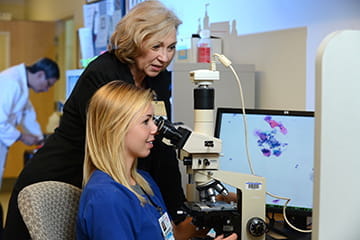Graduates of the Indiana University School of Medicine Nuclear Technology program have the technical proficiency in all skills necessary to fulfill the role as a nuclear medicine technologist. Our alumni are able to acquire, comprehend, apply and evaluate patient information in order to offer appropriate patient care and demonstrate appropriate administrative functions within the scope of the profession. The program also prepares students to continue to learn and grow professionally.
Upon completion of the Nuclear Medicine Technology program in the IU School of Medicine Department of Radiology and Imaging Sciences, the graduate will demonstrate and sustain appropriate ethical and interpersonal working relationships with patients, physicians and co-workers; participate in continuing education and professional activities; and aspire toward professional growth in areas of advanced technical positions, administration, teaching, health care industry or higher educational degree levels.



